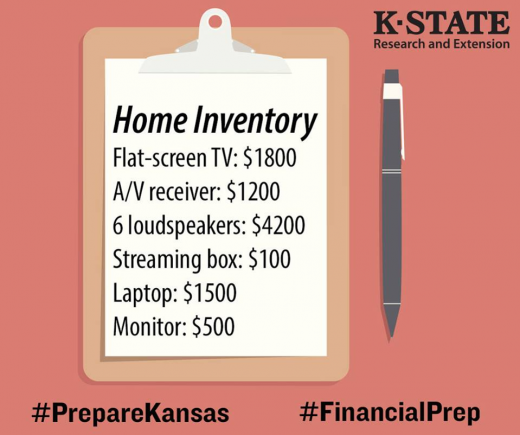 For far too many of us, the money we earn is spent almost as soon as we make it. For those managing burdens of debt, it could be argued that the money we earn is already spent before we earn it.
For far too many of us, the money we earn is spent almost as soon as we make it. For those managing burdens of debt, it could be argued that the money we earn is already spent before we earn it.
But what if you could pay yourself first, and keep some of those earnings for things you need today, or might need tomorrow?
“We know that Americans for several years — actually some decades, probably — have not saved as much as Americans in the past,” said Elizabeth Kiss, a family resource management specialist for K-State Research and Extension.
America Saves (americasaves.org) provides a list of strategies to help individuals and families grow their nest egg, rather than scramble their finances.
Start With A Plan — The old adage is true: Those who fail to plan, plan to fail. Saving money requires some thought, and a plan of action. “Looking at your goals, think about how much money you need, how much you can realistically put aside on a regular basis, and that’s the plan part,” Kiss says. “Without a plan we’re just kind of maneuvering without full information, without direction.”
Automate The Process — Most wage earners are paid by direct deposit. It might be possible to have your paycheck deposited into two or more different accounts, designating one of those accounts for savings. “If you don’t see that money in your checking account, it was never really there, you don’t miss it. And hopefully you’ll think twice before taking it out of savings,” says Kiss.
These things take practice, so don’t be surprised if it takes two or more attempts at finding just the right amount to be set aside — an amount that will still leave you enough for regular expenses.
Expect the Unexpected — Things happen. The car needs a repair, the dishwasher breaks down, your kid knocks a glass of water onto your phone. Saving for those “rainy day” eventualities takes some of the sting out of those surprises when (not “if”) they happen. Kiss advises that health expenses should probably have their own separate column or account, away from the Rainy Day Fund. “Health expenses are a little bit different, so money for deductibles and co-pays should probably keep that money separate from the Rainy Day Fund,” she says.
Saving Shouldn’t Be Boring — We all need to unwind, whether it’s a night at the movies or a weekend at the beach. A good savings plan should have some fun, some discretionary money built into it. “If you’re meeting your basic needs and all of your financial responsibilities, and putting some aside for the future, there’s no reason not to have some fun money, too,” says Kiss.
Saving to Stop Working — Things like Social Security and pension plans can only cover so much. If you plan to stop working in your later years, you’ll need to plan today, for tomorrow. Some employers match contributions to a retirement plan, Kiss says, and that could be the biggest wrench in your toolkit. “If you need to put in a certain amount to get the maximum match from your employer, that’s the ‘free money’ — that’s the no brainer. Do everything you can to put in what you need to, to get the maximum amount of matching funds.”
Save The Extras — Not all of life’s surprises are unpleasant: things like raises at work, tax refunds, gifts and inheritances. Those things don’t necessarily have to be an excuse to splurge. The recent tax reforms signed into law will take effect next year are a good opportunity for savings. “If you see an increase in your actual take home pay, think about putting at least some of that aside for whatever your financial goals are,” Kiss suggests. “Also, consider knocking down any debt you may have, whether its student loans, mortgages, or credit cards.”
Funds For the Whole Family! — Good habits start at home, and they start young. America Saves can help you teach younger members of the family about the importance of saving money and planning ahead. Some might balk at the idea of showing children where all Dad’s money goes, but Kiss says it’s a golden opportunity. “Talking to your children about your savings goals helps them to understand that you can’t always have everything right away. It’s the concepts of deferment, planning and making tradeoffs,” she says. “If the family wants to go on a vacation, ask the kids for ideas to help save money for that. Kids have great ideas and they just might surprise you.”
“If you’re realistic, and start with a small goal, that success can build up,” Kiss says. “One of the organizing principles of America Saves is that when you write it down and then share it with someone, you’re more likely to continue to work toward your goal and to have better success at achieving it.”
By: Nora Rhoades
 The Estate Planning workshops will have sessions with attorneys and experts from K-State as well as a Q & A session at the end. Sessions will cover several topics including Getting Started with Estate Planning, Estate Planning Basics, and Farm & Small Business Succession.
The Estate Planning workshops will have sessions with attorneys and experts from K-State as well as a Q & A session at the end. Sessions will cover several topics including Getting Started with Estate Planning, Estate Planning Basics, and Farm & Small Business Succession. Explore and understand tools – some familiar, some not – that will allow you to preserve and pass on your values through an estate plan. The program, hosted by the Post Rock Extension District and the Osborne County Community Foundation, will be valuable for those considering making charitable estate gifts and for charities and charity board members interested in learning about these options. Discover complete event details at
Explore and understand tools – some familiar, some not – that will allow you to preserve and pass on your values through an estate plan. The program, hosted by the Post Rock Extension District and the Osborne County Community Foundation, will be valuable for those considering making charitable estate gifts and for charities and charity board members interested in learning about these options. Discover complete event details at  ather with family and close friends over the holidays, consider incorporating a time to discuss your advance health care directives. The resource,
ather with family and close friends over the holidays, consider incorporating a time to discuss your advance health care directives. The resource,  Call the fraud department. Explain that someone stole your identity. Ask them to close or freeze the accounts. Then, no one can add new charges unless you agree.
Call the fraud department. Explain that someone stole your identity. Ask them to close or freeze the accounts. Then, no one can add new charges unless you agree. Being prepared for the disasters that may affect your home, business and community is important. Taking inventory of what you have and recording it is a good place to start. After all, you do not know where to get back to if you don’t know where you started, right?
Being prepared for the disasters that may affect your home, business and community is important. Taking inventory of what you have and recording it is a good place to start. After all, you do not know where to get back to if you don’t know where you started, right?